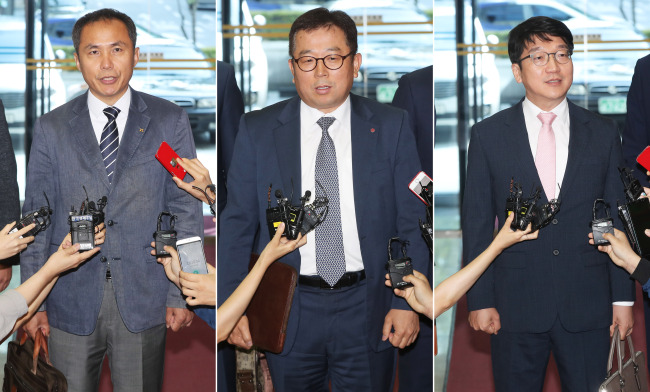BUNDANG, Gyeonggi Province – An auction for frequency spectrums for the upcoming fifth-generation telecom services kicked off on Friday at the heavily guarded headquarters of Telecommunications Technology Association in Bundang, Gyeonggi Province, with participation from executives of the country’s three mobile carriers determined to secure high-quality and efficient frequencies.
At around 8:15 a.m., KT’s senior vice president Kim Soon-yong appeared in the lobby of the TTA building vowing to secure target frequencies for the company’s fifth-generation network services.
“This auction carries significance as the country’s first supply of 5G frequencies,” Kim said before walking into the first basement floor of the building, where three bidding rooms are located. “KT will secure needed frequencies in order to provide the world’s first and best quality 5G services.”

From left: KT senior vice president Kim Soon-yong, LG Uplus' vice president Kang Hak-joo, and SK Telecom's vice president Lim Hyoung-do (Yonhap)
Since the bidders are not allowed to make any contact with each other, the executives showed up in intervals of about 5 minutes.
Kang Hak-joo, vice president of LG Uplus arrived after the KT bidder entered his room, saying “We have made thorough preparations to get frequencies that we want.”
SK Telecom’s vice president Lim Hyoung-do entered the TTA building at around 8:30 a.m., saying “We are fully ready and will do the best biding by the auction rules.”
The auction began at 9:30 a.m. sharp, with six rounds to go by 6 p.m.
The mobile carriers are bidding for 28 blocks in the 3.5-gigahertz spectrum and 24 blocks in the 28GHz spectrum, with a total price set by the government at 3.3 trillion won ($3.11 billion).
The Ministry of Science and ICT for the first time introduced a clock auction, in which the auctioneer begins with a high asking price and lowers it until some participant accepts the price. The auction will run a total of 50 rounds -- six rounds each day -- until June 27.
The auction will be divided into two phases.
During the first phase, the three companies will decide the number of blocks they want to purchase. And they will decide the positions of the frequencies in the next phase.
In each round, the ministry will set an asking price, and the companies will decide how many blocks they will buy at the government’s price.
For a fairer auction for all three companies, the ministry will also offer the bidders the chance to set prices on their own and adjust the block numbers on the condition that the company’s price should be higher than the winning price in the previous round.
“The bidders’ chance to set their own prices will help reduce financial burdens on the operators,” said Ryu Je-myung, director general of frequency policy bureau at the ministry. “The new rule will lower the possibility of a company purchasing frequencies at an unaffordable price.”
The first phase of the auction is expected to be finished by around 3 p.m. If the first phase is not completed by then, the second phase will be held on Monday due to time constraints.
(song@heraldcorp.com)






